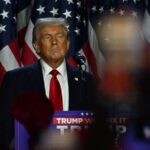Lawyers and policymakers believe that Trump’s stance could have a spillover effect in India as well, whose tech regulations, which greatly mirror the European Union’s restrictive rules against Big Tech, could become less stringent, making it easier for the American tech titans to operate, they said.
Tech industry veterans that Mint spoke with all agreed that the backing of Trump’s presidential campaign by technology chiefs such as Tesla’s Elon Musk and Meta’s Mark Zuckerberg is a sign that going forward, Big Tech would look to bargain for less-intense calls for stringent anti-competitive measures by leveraging their ties with the 47th president of the United States.
“Big Tech, under Biden, has not had just a difficult four years in terms of being scrutinized on their own home turf—they’ve also felt partially betrayed and left open to the constant firing from the European Union (EU)’s regulators on privacy, market dominance and competition. By siding with Trump, they’ve flipped most of their own stances that they had taken during his previous tumultuous tenure—which reflects that they’d now be hoping to get a more favourable regulatory and policy approach from the incoming government,” a senior adviser to tech firms on global policy told Mint, requesting anonymity.
Rahul Rai, partner and co-founder at law firm Axiom5, agreed: “Historically, with changes in government, the chair of the US Federal Trade Commission also changes, and the intensity of antitrust enforcement often aligns with the politico-economic ambitions of the government. Under the previous administration, the FTC faced significant pushback to its aggressive stance on tech and competition laws. With Trump’s more market-friendly, less interventionist approach, we are likely to see a shift in the US’s legal stance towards the tech industry.”
Global impact: India’s tech regulations, US influence
This, in turn, may reflect in India as well, stakeholders believe. Mathew Chacko, founding partner at law firm Spice Route Legal, said, “From a global perspective, there could be more pressure to not over-regulate technology and technology companies in strategic geographies—that is, to not enact policies that are overly restrictive in spirit. Alternatively, the US government may push for promoting ‘globalism’ within technology—such an approach may benefit both India and the US.”
Chacko added that the incoming Trump administration could put pressure on countries to temper their regulations that they may enact in their own national security interest.
“This isn’t a bad demand—while there are regulatory and security issues, there is a strong argument that India has more to gain with closer ties with the (US) West Coast (where several Big Tech firms are based),” he said.
India’s wait-and-watch approach to regulation
At the moment, India’s regulatory stance on technology is taking a slow step ahead—as it waits to see the overall approach that key jurisdictions concurrently take. A senior official close to the government’s policy approach said that while India “has not gone slow, we’re definitely not in a rush to add strictures on Big Tech—there’s a lot to mutually gain.”
Supratim Chakraborty, partner at law firm Khaitan & Co, echoed this approach, stating, “Most policymakers are taking a wait-and-watch approach, to see where other jurisdictions land up before working on a concrete direction for regulation to proceed in. This slow pace is likely to continue.”
This wait-and-watch approach, policy advisers said, could be to see Trump’s tech policy to take shape, before firming up their own stance. Kazim Rizvi, founding director of policy think-tank The Dialogue, said, “While Trump may take a pro-business approach, he has also strongly said that companies must shift supply chains to the US, and could accelerate export controls on hardware, software and AI for national security purposes. Some of the moves could have an impact on India’s access to technologies from the US, but it’s unlikely that all of these moves would have an imminent impact on India’s tech regulations.”
This could further complicate India’s policymaking. India’s technology regulations so far, including the notified Digital Personal Data Protection Act, 2023 and the upcoming Digital Competition Bill, are modelled after the EU’s regulatory stance.
“India’s tech laws are closely aligned with EU regulations, and over the past decade, India’s enforcement of these laws has mirrored the EU’s approach more than the US’s. The key difference, however, is that the US has traditionally taken the view that as long as competition benefits consumers, a company is considered in the clear. In contrast, both India and the EU have emphasized a more balanced approach, ensuring that both consumers and businesses are not harmed by anti-competitive practices,” Rai said.
Thus, Rai underlined that India’s tech regulatory stance may not entirely alter—even though policymakers in India may proceed with a softer touch and slower pace in order to understand how best to leverage bilateral relations.









